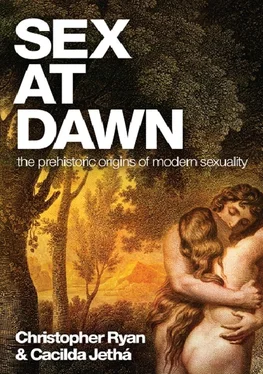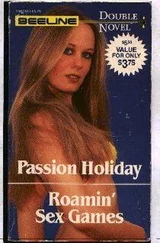Christopher Ryan - Sex at Dawn
Здесь есть возможность читать онлайн «Christopher Ryan - Sex at Dawn» весь текст электронной книги совершенно бесплатно (целиком полную версию без сокращений). В некоторых случаях можно слушать аудио, скачать через торрент в формате fb2 и присутствует краткое содержание. Жанр: Прочая научная литература, на английском языке. Описание произведения, (предисловие) а так же отзывы посетителей доступны на портале библиотеки ЛибКат.
- Название:Sex at Dawn
- Автор:
- Жанр:
- Год:неизвестен
- ISBN:нет данных
- Рейтинг книги:4 / 5. Голосов: 1
-
Избранное:Добавить в избранное
- Отзывы:
-
Ваша оценка:
- 80
- 1
- 2
- 3
- 4
- 5
Sex at Dawn: краткое содержание, описание и аннотация
Предлагаем к чтению аннотацию, описание, краткое содержание или предисловие (зависит от того, что написал сам автор книги «Sex at Dawn»). Если вы не нашли необходимую информацию о книге — напишите в комментариях, мы постараемся отыскать её.
Sex at Dawn — читать онлайн бесплатно полную книгу (весь текст) целиком
Ниже представлен текст книги, разбитый по страницам. Система сохранения места последней прочитанной страницы, позволяет с удобством читать онлайн бесплатно книгу «Sex at Dawn», без необходимости каждый раз заново искать на чём Вы остановились. Поставьте закладку, и сможете в любой момент перейти на страницу, на которой закончили чтение.
Интервал:
Закладка:
Oriented toward medicine and business, American society has responded to this ongoing crisis by developing a marital-industrial complex of couples therapy, pharmaceutical hard-ons, sex-advice columnists, creepy father-daughter purity cults, and an endless stream of in-box come-ons (“Unleash your LoveMonster! She’ll thank you!”). Every month, truckloads of glossy supermarket magazines offer the same old tricks to get the spark back into our moribund sex lives.
Yes, a few candles here, some crotchless panties there, toss a handful of rose petals on the bed and it’ll be just like the very first time! What’s that you say? He’s still checking out other women? She’s still got an air of detached disappointment? He’s finished before you’ve begun?
Well, then, let the experts figure out what ails you, your partner, your relationship. Perhaps his penis needs enlarging or her vagina needs a retrofit. Maybe he has “commitment issues,” a “fragmentary superego,” or the dreaded “Peter Pan complex.” Are you depressed? You say you love your spouse of a dozen years but don’t feel sexually attracted the way you used to? One or both of you are tempted by another? Maybe you two should try doing it on the kitchen floor. Or force yourself to do it every night for a year. 4Maybe he’s going through a midlife crisis. Take these pills. Get a new hairstyle. Something must be wrong with you.
Ever feel like the victim of a well-intentioned Inquisition?
This split-personality relationship with our true sexual nature is anything but news to entertainment corporations, who have long reflected the same fractured sensibility between public pronouncement and private desire. In 2000, under the headline “Wall Street Meets Pornography,” The New York Times reported that General Motors sold more graphic sex films than Larry Flynt, owner of the Hustler empire. Over eight million American subscribers to DirecTV, a General Motors subsidiary, were spending about $200 million a year on pay-per-view sex films from satellite providers. Similarly, Rupert Murdoch, owner of the Fox News Network and the nation’s leading conservative newspaper, The Wall Street Journal, was pulling in more porn money through a satellite company than Playboy made with its magazine, cable, and Internet businesses combined. 5AT&T, also a supporter of conservative values, sells hard-core porn to over a million hotel rooms throughout the country via its Hot Network.
The frantic sexual hypocrisy in America is inexplicable if we adhere to traditional models of human sexuality insisting that monogamy is natural, marriage is a human universal, and any family structure other than the nuclear is aberrant. We need a new understanding of ourselves, based not on pulpit proclamations or feel-good Hollywood fantasies, but on a bold and unashamed assessment of the plentiful scientific data that illuminate the true origins and nature of human sexuality.
We are at war with our eroticism. We battle our hungers, expectations, and disappointments. Religion, politics, and even science square off against biology and millions of years of evolved appetites. How to defuse this intractable struggle?
In the following pages, we reassess some of the most important science of our time. We question the deepest assumptions brought to contemporary views of marriage, family structure, and sexuality—issues affecting each of us every day and every night.
We’ll show that human beings evolved in intimate groups where almost everything was shared—food, shelter, protection, child care, even sexual pleasure. We don’t argue that humans are natural-born Marxist hippies. Nor do we hold that romantic love was unknown or unimportant in prehistoric communities. But we’ll demonstrate that contemporary culture misrepresents the link between love and sex. With and without love, a casual sexuality was the norm for our prehistoric ancestors.
Let’s address the question you’re probably already asking: how can we possibly know anything about sex in prehistory? Nobody alive today was there to witness prehistoric life, and since social behavior leaves no fossils, isn’t this all just wild speculation?
Not quite. There’s an old story about the trial of a man charged with biting off another man’s finger in a fight. An eyewitness took the stand. The defense attorney asked, “Did you actually see my client bite off the finger?” The witness said, “Well, no, I didn’t.” “Aha!” said the attorney with a smug smile. “How then can you claim he bit off the man’s finger?” “Well,” replied the witness, “I saw him spit it out.”
In addition to a great deal of circumstantial evidence from societies around the world and closely related nonhuman primates, we’ll take a look at some of what evolution has spit out. We’ll examine the anatomical evidence still evident in our bodies and the yearning for sexual novelty expressed in our pornography, advertising, and after-work happy hours. We’ll even decode messages in the so-called “copulatory vocalizations” of thy neighbor’s wife as she calls out ecstatically in the still of night.
Readers acquainted with the recent literature on human sexuality will be familiar with what we call the standard narrative of human sexual evolution (hereafter shortened to “the standard narrative”). It goes something like this:
1. Boy meets girl.
2. Boy and girl assess one another’s mate value from perspectives based upon their differing reproductive agendas/ capacities:
• He looks for signs of youth, fertility, health, absence of previous sexual experience, and likelihood of future sexual fidelity. In other words, his assessment is skewed toward finding a fertile, healthy young mate with many childbearing years ahead and no current children to drain his resources.
• She looks for signs of wealth (or at least prospects of future wealth), social status, physical health, and likelihood that he will stick around to protect and provide for their children. Her guy must be willing and able to provide materially for her (especially during pregnancy and breastfeeding) and their children (known as male parental investment).
3. Boy gets girl: assuming they meet one another’s criteria, they “mate,” forming a long-term pair bond—the “fundamental condition of the human species,” as famed author Desmond Morris put it. Once the pair bond is formed:
• She will be sensitive to indications that he is considering leaving (vigilant toward signs of infidelity involving intimacy with other women that would threaten her access to his resources and protection)—while keeping an eye out (around ovulation, especially) for a quick fling with a man genetically superior to her husband.
• He will be sensitive to signs of her sexual infidelities (which would reduce his all-important paternity certainty)—while taking advantage of short-term sexual opportunities with other women (as his sperm are easily produced and plentiful).
Researchers claim to have confirmed these basic patterns in studies conducted around the world over several decades. Their results seem to support the standard narrative of human sexual evolution, which appears to make a lot of sense. But they don’t, and it doesn’t.
While we don’t dispute that these patterns play out in many parts of the modern world, we don’t see them as elements of human nature so much as adaptations to social conditions—many of which were introduced with the advent of agriculture no more than ten thousand years ago. These behaviors and predilections are not biologically programmed traits of our species; they are evidence of the human brain’s flexibility and the creative potential of community.
To take just one example, we argue that women’s seemingly consistent preference for men with access to wealth is not a result of innate evolutionary programming, as the standard model asserts, but simply a behavioral adaptation to a world in which men control a disproportionate share of the world’s resources. As we’ll explore in detail, before the advent of agriculture a hundred centuries ago, women typically had as much access to food, protection, and social support as did men. We’ll see that upheavals in human societies resulting from the shift to settled living in agricultural communities brought radical changes to women’s ability to survive. Suddenly, women lived in a world where they had to barter their reproductive capacity for access to the resources and protection they needed to survive. But these conditions are very different from those in which our species had been evolving previously.
Читать дальшеИнтервал:
Закладка:
Похожие книги на «Sex at Dawn»
Представляем Вашему вниманию похожие книги на «Sex at Dawn» списком для выбора. Мы отобрали схожую по названию и смыслу литературу в надежде предоставить читателям больше вариантов отыскать новые, интересные, ещё непрочитанные произведения.
Обсуждение, отзывы о книге «Sex at Dawn» и просто собственные мнения читателей. Оставьте ваши комментарии, напишите, что Вы думаете о произведении, его смысле или главных героях. Укажите что конкретно понравилось, а что нет, и почему Вы так считаете.












